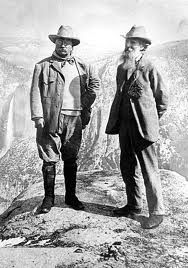The debate over climate change policy has historically been dominated by globalist proposals that impose a crushing socioeconomic burden on the United States and weaken us by endangering our energy reliability. Meanwhile, China, Russia, and the developing countries of the global south would continue to prioritize strengthening their economies and national power even at the cost shamelessly increasing their carbon emissions. As I discussed in this post, the American nationalist approach of Theodore Roosevelt would balance environmental responsibility, national security, and economic fairness to achieve realistic carbon reductions as well as the necessary adaptations to the changing climate.
The (unfortunately misnamed) Inflation Reduction Act recently negotiated by Sen. Joe Manchin and Democratic Senate leadership is a step in the right direction despite its various flaws. It appropriates $380 billion over ten years to spur production and installation of clean energy technology, as opposed to the original budget-busting $1.78 trillion of President Biden’s Build Back Better proposal. At the same time, it contains tax credits for nuclear power and clean hydrogen. It also recognizes that oil and gas must remain part of the energy mix for now by opening up off-shore and federal lands for drilling (for an in-the-weeds analysis of the energy provisions, see this link to one law firm’s analysis).
There is, however, a cost. To be at least deficit-neutral, it primarily relies on the following revenue and tax increases:
Authorizing Medicare to negotiate and purchase certain prescription drugs in bulk for Medicare drug plans
Creating a 15% minimum corporate income tax
Strengthening IRS enforcement efforts
Imposing a new fee on excess emissions of methane from oil and gas facilities
Tightening the loophole that taxes investment manager’s income at capital gains rates instead of ordinary income rates.
All of these are welcome changes in tax and spending policy in and of themselves. The Committee for a Responsible Federal Budget estimates the legislation will result in a small 155 billion reduction in the budget deficit over the next ten years.
The bill could have been better in two ways. While it imposes domestic content and prevailing wage requirements on clean energy producers, a more robust tariff to support domestic producers and prevent Chinese predatory pricing should have been added. As even the New York Times admits, the bill also allocates far too little to expanding and modernizing the transmission grid to support large scale energy projects so important to achieving energy reliability. Indeed, it seems to favor rooftop solar and other forms of distributed generation over central generation such as nuclear and gas-fired generation and wind farms that provide crucial backup generation. The Biden Administration has promised Sen. Manchin that the permitting process for such projects will be streamlined to encourage transmission projects in future legislation.
Nevertheless, the bill meets Roosevelt’s sobering realism expressed above by beginning the process of reducing carbon emissions here at home, but not at the price of economic dislocation or strategic weakness. Much more needs to be done, especially in the realm of climate adaptation. However, America would retain the leadership in environmental stewardship that TR established while refraining from sacrificing its strength. This is the kind of national responsibility he would have enthusiastically supported.


